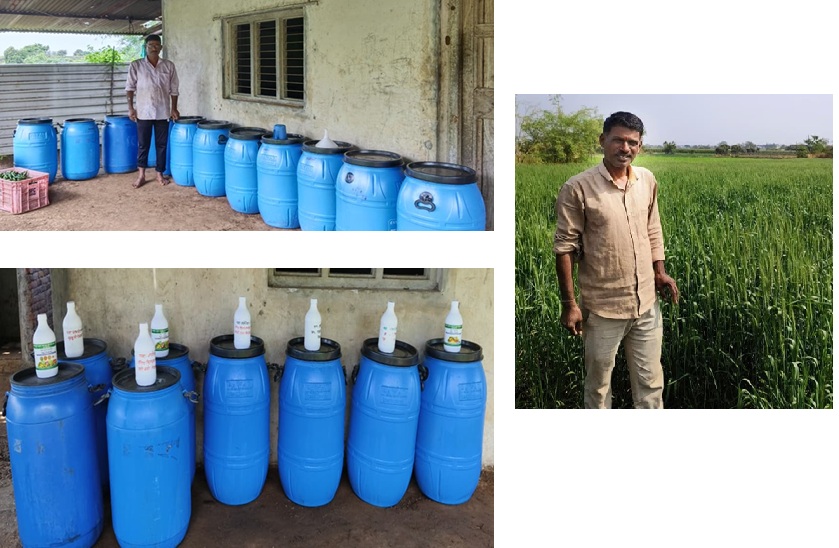Mr. Sandeep Shankar Jadhav

Pioneered Farmer to Consumer Model through the brand “ Sampoorna Veggies and Fruits”.
Organized 150 farmers into a collective for direct marketing in Mumbai, Pune, Nashik.
Established an on-farm bio-input production center for preparing and multiplying organic formulations.
Integrated traditional knowledge with modern techniques (drip irrigation, mulching, relay cropping).
Promoted health-centric farming -family has not required hospital treatment for the last 25 years due to safe food consumption.
A Bio-input Production and Multiplication Center established at the farm. Facilities include fermentation drums, storage units, and input preparation space. Inputs prepared: Jeevamrut, Ghan Jeevamrut, Beejamrut, Agniastra, Dashparni Ark, cow urine extract. The center also produces multiplications of microbial cultures sourced from KVK and YCMOU.

Raw materials: Cow dung, cow urine, jaggery, pulse flour, green leaves, buttermilk. Microbial inoculants: Azotobacter, Rhizobium, Trichoderma, Pseudomonas, PSB, KSB. Fermentation: Inputs are kept in drums for 7–10 days for microbial multiplication. Products: Jeevamrut, Beejamrut, Dashparni Ark, Agniastra, cow urine extract, neem-based extracts. Application: Soil drenching, foliar sprays, and seed treatment.
Direct marketing through Farmers’ Markets in Mumbai, Pune and Nashik. Produce collected at collection centers , graded and packed for urban supply. Brand: “Sampoorna Veggies and Fruits” . Stable annual pricing for both farmers and consumers ensures trust. Collective strength: 150 farmers under the Sampoorna umbrella.
Cost of cultivation: ₹8,000–₹9,000 per acre (only 20% of chemical farming). Savings: ₹50,000 per acre due to elimination of chemical fertilizers and pesticides. Net income: ₹1–1.5 lakh per acre annually. Healthcare savings: Zero medical expenses for the family in 25 years.
Over 150 farmers joined the Sampoorna collective inspired by Mr. Jadhav. Farm visits and “Farm Schools” organized regularly to demonstrate natural farming. Spread of farmer-to-consumer marketing model in surrounding villages. Encouraged adoption of bio-input production units at other farms.
Provide continuous training programs on natural farming practices and preparation of bio-inputs. Supply mother cultures and starter inoculants for microbial multiplications. Facilitate demonstration plots at KVK and farmer fields. Strengthen farmer collectives and FPOs for direct marketing support. Develop value-addition units for organic produce (pickles, powders, juices). Create linkages with APEDA and certification bodies for organic product branding. Promote success stories through exposure visits, media coverage, and publications.